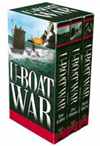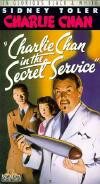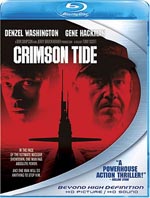
|
Iron CoffinsLanguage:
SummaryThis documentary, Part III of The U-boat War series, provides an overview of the Battle of the Atlantic from 1943 through the end of World War II.The title of this episode is identical to that of Herbert Werner's memoirs, and the former commander of U-953 expresses here, as he does in his book, his belief that the lives of U-boat men were recklessly wasted in the last years of the war. His assertion that they were literally trained to commit suicide is matched by Erich Topp's recollection of a speech in which Grossadmiral Dönitz spoke of the men's "fanatical willingness to die". The other side of the debate, reflecting Dönitz' view that continued use of U-boats after 1943 was not a senseless waste of life, but a valiant sacrifice that served to tie down Allied resources and buy time until the technologically advanced Type XXI boats were ready to be put into service, is also explored. The distinction between fanatic devotion to the military service, exhibited by the majority of U-boat men, and devotion to Nazism, manifested by few, is noted. Much ground is covered in this episode, including technological developments such as radar, Metox, the Leigh light, HF/DF, and the Schnorchel; tactical innovations such as aircraft carriers, U-boat tankers or Milch Cows, and hunter-killer groups; and historical landmarks, including the final turn of the tide against the U-boats in May 1943 (Black May), Operation Deadlight, and the trial of Dönitz at Nüremberg. The use of footage in this segment is excellent, including film of Wolfgang Lüth's return after an incredible 205-day cruise on U-181, and footage of U-boats refueling from tankers. A scene from Action in the North Atlantic introduces the subject of wartime propaganda, after which the myth of U-boat men machine-gunning survivors in the water or in lifeboats is finally laid to rest. One of the historians interviewed notes that, except for a single documented incident, the conduct of U-boat commanders and crews was "impeccably correct" in regards to the rules of warfare and human decency. To illustrate the paradoxical care U-boat commanders often took to succor the survivors of the ships they had just destroyed, the Laconia incident is treated in some detail. Survivor Dr. Tony Large, who spent 40 days in a lifeboat after an attack by an American bomber forced Kptlt. Werner Hartenstein to break off rescue operations, tells his tale against a background of excellent footage of the scene. The documentary closes with a short segment on the newly salvaged U-534, which is now at Liverpool. The other volumes in the series are Attack America and Sea Wolves.
NotesOf the three videos in this collection, this last volume made the best use of footage. The coverage was well-balanced, and like the other two volumes was based on accounts of veterans and on the work of leading scholars in the field.A German-language version of this series is available as Der U-Boot Krieg (Seewölfe, Angriff auf Amerika, Eiserne Särge). |






